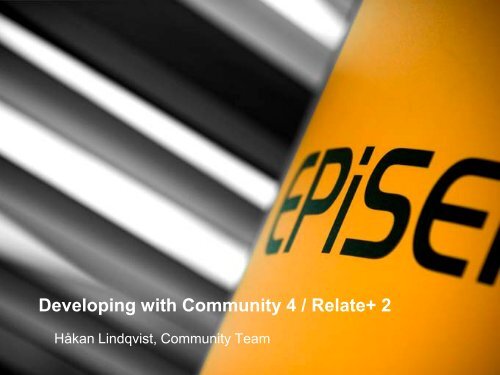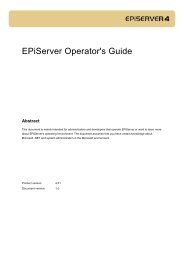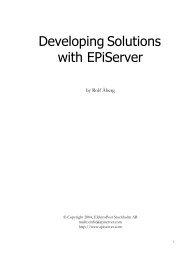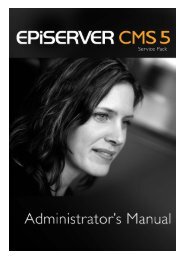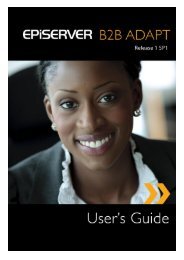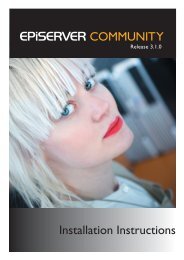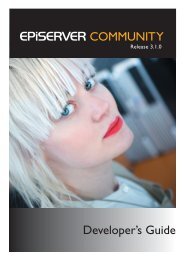Using the new features in Community 4.0 to ... - EPiServer World
Using the new features in Community 4.0 to ... - EPiServer World
Using the new features in Community 4.0 to ... - EPiServer World
You also want an ePaper? Increase the reach of your titles
YUMPU automatically turns print PDFs into web optimized ePapers that Google loves.
Develop<strong>in</strong>g with <strong>Community</strong> 4 / Relate+ 2<br />
Håkan L<strong>in</strong>dqvist, <strong>Community</strong> Team
2<br />
Agenda<br />
» Brief <strong>EPiServer</strong> <strong>Community</strong> <strong>in</strong>troduction<br />
» What’s <strong>new</strong> <strong>in</strong> <strong>Community</strong> 4 / Relate+ 2<br />
» A more <strong>in</strong>-depth look at a few of <strong>the</strong> <strong>new</strong> <strong>features</strong><br />
» Live Demo (some Visual Studio fun)<br />
» Questions
3<br />
<strong>EPiServer</strong> <strong>Community</strong> <strong>in</strong>troduction<br />
» The core <strong>Community</strong> platform<br />
» APIs that handle data s<strong>to</strong>rage, cach<strong>in</strong>g, aggregation,<br />
etc
4<br />
<strong>EPiServer</strong> <strong>Community</strong> overall architecture<br />
Site / services / o<strong>the</strong>r (eg Relate+)<br />
Moderation / Adm<strong>in</strong><br />
<strong>Community</strong> – MyPage, Blog, Forum, Club, etc.<br />
Cus<strong>to</strong>m<br />
Framework functionality – Tags, Comments, Categories, etc.<br />
Core functionality – Cach<strong>in</strong>g, database access, etc.<br />
Database<br />
Disk s<strong>to</strong>rage
5<br />
<strong>EPiServer</strong> <strong>Community</strong> basics: Create<br />
» Example: Add a blog entry for <strong>the</strong> current user<br />
Blog userBlog = MyPageHandler.Instance.<br />
GetMyPage(SecurityHandler.Instance.CurrentUser).Blog;<br />
Entry entry = <strong>new</strong> Entry(userBlog, "header", "body",<br />
<strong>new</strong> UserAuthor(SecurityHandler.Instance.CurrentUser))<br />
{ Status = EntityStatus.Pend<strong>in</strong>g };<br />
entry = BlogHandler.Instance.AddEntry(entry);
6<br />
<strong>EPiServer</strong> <strong>Community</strong> basics: Read<br />
» Example: Get a paged list<br />
<strong>in</strong>t <strong>to</strong>talItems;<br />
EntryCollection entries = BlogHandler.Instance.<br />
GetEntries(userBlog, EntryPublishState.Published, 1, 5,<br />
out <strong>to</strong>talItems, <strong>new</strong> EntrySortOrder(EntrySortField.Created,<br />
Common.Sort<strong>in</strong>g.Sort<strong>in</strong>gDirection.Descend<strong>in</strong>g));<br />
» Example: Get a specific entry by ID<br />
entry = BlogHandler.Instance.GetEntry(7000);
7<br />
<strong>EPiServer</strong> <strong>Community</strong> basics: Update<br />
» Example: Update a blog entry<br />
entry = entry.Clone() as Entry;<br />
entry.Status = EntityStatus.Approved;<br />
BlogHandler.Instance.UpdateEntry(entry);<br />
entry = BlogHandler.Instance.GetEntry(entry.ID);
8<br />
<strong>EPiServer</strong> <strong>Community</strong> basics: Delete<br />
» Example: Remove an entry (permanently)<br />
BlogHandler.Instance.RemoveEntry(entry);<br />
» Example: Soft-remove an entry (can be res<strong>to</strong>red)<br />
entry = entry.Clone() as Entry;<br />
entry.Status = EntityStatus.Removed;<br />
BlogHandler.Instance.UpdateEntry(entry);
9<br />
<strong>Community</strong> basics: EntityProvider<br />
» Configuration maps types <strong>to</strong> providers<br />
EntityProviderHandler.Instance.<br />
GetEntityProvider(typeof(Entry)).<br />
AddEntityInstance(<strong>new</strong> Entry(...));<br />
entry = EntityProviderHandler.Instance.<br />
GetEntityProvider(typeof(Entry)).<br />
GetEntityInstance(typeof(Entry), 7000) as Entry;<br />
EntityProviderHandler.Instance.<br />
GetEntityProvider(typeof(Entry)).<br />
UpdateEntityInstance(entry);<br />
EntityProviderHandler.Instance.<br />
GetEntityProvider(typeof(Entry)).<br />
RemoveEntityInstance(entry);
What’s <strong>new</strong> <strong>in</strong> <strong>Community</strong> 4<br />
10
11<br />
Some visi<strong>to</strong>r-visible <strong>features</strong> overview<br />
» Full Text Search<br />
» RSS/A<strong>to</strong>m feeds<br />
» RSS/A<strong>to</strong>m syndication<br />
» Metaweblog API publish<strong>in</strong>g<br />
» HTML filter<strong>in</strong>g<br />
» OpenID
12<br />
Developer <strong>features</strong><br />
» IContent <strong>in</strong>terface<br />
» Owner system<br />
» Site object has been elim<strong>in</strong>ated<br />
» Category system replaces Site, fetch entities by<br />
category<br />
» Handlers s<strong>in</strong>gle<strong>to</strong>ns <strong>in</strong>stead of static<br />
» URI providers<br />
» Event Counter
13<br />
Developer <strong>features</strong> (cont<strong>in</strong>ued)<br />
» EntityStatus<br />
» EntitySecurity<br />
» EntityProvider system has been extended <strong>to</strong> do not<br />
only read but CRUD<br />
» EntityReference<br />
» GUIDs as an alternative means of referenc<strong>in</strong>g entities
14<br />
Changed site setup<br />
» Switched <strong>to</strong> log4net based logg<strong>in</strong>g<br />
» <strong>EPiServer</strong> Events utilized <strong>in</strong> cluster environments<br />
(Cache notifications, etc)<br />
» Utilizes <strong>EPiServer</strong> Framework siteHostMapp<strong>in</strong>g for<br />
multi-site, ”enterprise”, configurations.<br />
» Starts as an <strong>EPiServer</strong> Framework <strong>in</strong>itialization<br />
module.<br />
» User <strong>in</strong>tegration simplified
An <strong>in</strong>-depth look at some <strong>new</strong> <strong>features</strong><br />
15
16<br />
IContent – consistency, generic handl<strong>in</strong>g<br />
» Dictates generic content properties<br />
public <strong>in</strong>terface IContent : IEntity, ..., ILocalized<br />
{<br />
IAuthor Author { get; set; }<br />
str<strong>in</strong>g Body { get; set; }<br />
DateTime Created { get; }<br />
str<strong>in</strong>g Header { get; set; }<br />
DateTime Modified { get; }<br />
}<br />
public <strong>in</strong>terface ILocalized<br />
{<br />
str<strong>in</strong>g LanguageID { get; set; }<br />
}
17<br />
Owner system<br />
» Creates relationship between arbitrary entities<br />
» An entity can only have a s<strong>in</strong>gle owner<br />
» Owned entities are removed when owner is removed<br />
» Example: Set ownership<br />
imageGallery.OwnedBy.Entity = entry;<br />
imageGallery.OwnedBy.Context = "special_blog_pictures";<br />
ImageGalleryHandler.Instance.UpdateImageGallery(imageGallery);
18<br />
Owner system (cont<strong>in</strong>ued)<br />
» Example: Get specific owned object, or all owned<br />
objects for a specific entity<br />
EntityReference galleryReference =<br />
OwnerHandler.Instance.GetOwnedObject(entry,<br />
"special_blog_pictures");<br />
IDictionary owned =<br />
OwnerHandler.Instance.GetObjectsByOwner(imageGallery);<br />
galleryReference = owned["special_blog_pictures"];<br />
imageGallery = galleryReference.GetEntity() as<br />
ImageGallery;
20<br />
GUIDs for entities<br />
» UniqueID property on entities<br />
» Can get EntityReference by GUID<br />
» Useful when reference has <strong>to</strong> be persisted<br />
Guid entryGuid = entry.UniqueID;<br />
EntityReference entryReference = EntityProviderHandler.Instance.<br />
GetEntityReference(entryGuid);<br />
entry = entryReference.GetEntity() as Entry;
21<br />
Full Text Search overview<br />
» Implemented as client/service<br />
» Search client <strong>in</strong>cluded <strong>in</strong> <strong>EPiServer</strong> Framework<br />
» Site pushes data <strong>to</strong> <strong>in</strong>dex, no crawl<strong>in</strong>g<br />
» Pro<strong>to</strong>col open (essentially A<strong>to</strong>m feeds sent <strong>in</strong> a<br />
REST-like fashion)<br />
» Default service implementation <strong>in</strong>cluded, based on<br />
Lucene.net
22<br />
Full Text Search <strong>in</strong> <strong>Community</strong><br />
» <strong>Community</strong> entities, as specified by type name <strong>in</strong> <strong>the</strong><br />
configuration are <strong>in</strong>dexed tak<strong>in</strong>g values from<br />
IContent, <strong>the</strong>n any specifics on a type by type basis<br />
» Relate+ extends this by also <strong>in</strong>dex<strong>in</strong>g CMS pages<br />
and files which become searchable through <strong>the</strong> same<br />
<strong>in</strong>terface
23<br />
EntitySecurity<br />
» Example: Give Read and Modify permission <strong>to</strong> user:<br />
EntitySecurityHandler.Instance.<br />
SetAccessRights(entry, user,<br />
<strong>new</strong> EntryAccessRights()<br />
{ Read = true, Modify = true });<br />
» Example: Check if user has Read permission:<br />
bool hasAccess = EntitySecurityHandler.Instance.<br />
CheckAccess(entry, user,<br />
<strong>new</strong> EntryAccessRights()<br />
{ Read = true });
24<br />
Demo<br />
» Demo
25<br />
Questions<br />
» Questions<br />
» hakan.l<strong>in</strong>dqvist@episerver.com


